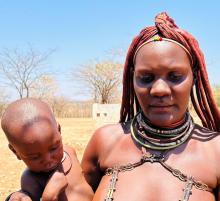Namibia Strengthens Child Malnutrition Measures
Windhoek –Vakahoka Matundu of Otjerunda village, faced a crisis when her two-year old daughter was diagnosed with acute malnutrition. A community health worker identified the issue and quickly referred her to Opuwo District Hospital for treatment. Reflecting on the journey, Vakahoka shares, “The community health worker has been very helpful, visiting us regularly to check up on my child's progress. My child is doing well now, and we are up to date with her immunizations.”
Namibia is the world’s second most unequal society, with a few people holding most of the wealth (measured by a Gini score of 59.1). Additionally, 43.3% of the population lives in poverty, lacking access to essential services, according to a 2015 World Bank’s Poverty and Equity Database. The nation faces a triple burden of malnutrition – overnutrition, undernutrition, and hidden hunger. National reports show a concerning rise in malnutrition cases among children under five in health facilities across the country. From January 2022, outpatient malnutrition cases increased from 8143 to 8765 in 2023, with 36.6% of these cases reported in the Omaheke, Khomas, and Kunene regions.
The COVID-19 pandemic and climate change have worsened Namibia’s nutrition crisis, affecting food security through unpredictable weather, droughts, and environmental damage. These issues increase the risk of malnutrition for vulnerable communities, highlighting urgent need for intervention.
In response, the Ministry of Health and Social Services (MoHSS) in collaboration with World Health Organization (WHO) and the Government of Japan, launched initiatives to improve nutrition services for women and children, especially in the most affected regions.
Anamary Tjituri, a community health worker in Otjerunda, has taken on a vital role in her village. Responsible for supporting over 50 households, Anamary recently completed training through the “Increasing Access to Quality Nutrition and Protection Services for Vulnerable Populations, including Women and Children” project. She says, “The training has empowered me, I can now hold health and nutrition sessions with the community." With new tools and resources, Anamary is helping families adopt essential health practices, tackling the malnutrition challenges that many face in her community.
In August 2024, 27 community health workers in Opuwo took a significant step forward in their mission to fight malnutrition. Through the “Nutrition-for-Health” training, these health workers gained the skills to educate their communities on essential nutrition and health practices. This programme, aimed at reducing preventable deaths and addressing malnutrition, has empowered them to lead group discussions and personal counselling sessions, directly bringing life-saving knowledge to families in need.
“I go door-to-door, checking on families’ health, nutrition, and hygiene, making sure children under 5 and pregnant women are well cared for”, explains Toini Mbutu, also a community health worker who benefitted from the training. Each week, she also holds group sessions, using local gatherings as an opportunity to spread essential health information to reach a wider audience.
Through these collaborative efforts, Namibia is making significant strides toward its goal of eliminating malnutrition by 2030, in alignment with the Sustainable Development Goals. By empowering community health workers and promoting nutrition education, the country is paving the way for healthier futures for its most vulnerable populations. Tomas Shapumba, Kunene Regional Director, expressed his gratitude for the vital support from WHO and the Government of Japan in reaching this goal. “With the assistance of community health workers, we are now better equipped to identify, assess, refer, and monitor the health needs of our community members more effectively,” he stated.
WHO continues to support the Namibian government, working alongside the Ministry of Health and Social Services and the Nutrition and Food Security Alliance of Namibia, to address malnutrition as a critical public health issue. Dr Richard Banda, WHO Representative to Namibia, emphasizes the need for a collaborative approach. “Malnutrition in all its forms is complex, requiring cooperation across sectors. We must work together to ensure that everyone, especially children and mothers, has access to the nutrition they need to thrive.”

